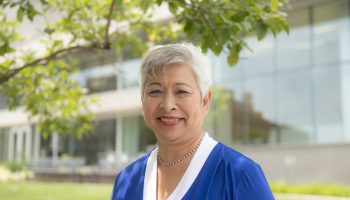
For many years, financial planners have been rewarded for steering clients toward financial products that the planners’ companies have developed or vetted and want to sell.
It is more efficient and less daunting to situate a client analysis in this way than it is to comprehensively analyze that individual and family’s particular situation — and then chart a financial pathway that focuses on their specific needs and wishes.
Financial advisers whose approach is marketing-oriented, rather than sales-oriented, can help people make intelligent money-related decisions that will leave them, and their family, better off in myriad ways.
Tailoring financial planning and decision-making to a family’s unique and evolving circumstances necessitates a different level of commitment and attention, as well as practical knowhow and creative thinking.
At 9:15 a.m. Tuesday at the Chautauqua Women’s Club House, Kim Ciccarelli Kantor will discuss “Bridging Generations: Preparing for Life’s Transitions with Purpose and Harmony,” as part of the CWC’s Chautauqua Speaks program.
Kantor is president and co-founder, with her brother Ray, of Ciccarelli Advisory Services, a family-focused wealth management registered investment adviser firm.
When starting the firm in 1983, “Ray and I wanted people to be more astute and savvy with their own financial picture and children,” Kantor said. “… Money relates to everything — every decision — and so does healthcare. … It’s a passionate subject for me when I see the difference between disaster and success. It doesn’t have to do with your net worth.”
Early on, Ciccarelli Advisory Services developed a number of the tools to facilitate their work with clients, including a website.
The firm’s mission is to “serve generations of families, bridging desires with personal and financial success.” For Kantor, this means “bridging all the planning and work the first generation would do to the other generations,” she said. “I’m working with fourth-generation families today, passing down trusts.”
Siblings Kim and Ray have done so in part by including their own family members among their 50 or so employees.
“I’m blessed to have a lot of family working for me,” Kantor said. “The culture is from our family to your family. We realized that our (initial) assumptions were wrong. Families aren’t functional like ours, so we started the family business-like concept.”
As for her definition of “family,” she said, “You tell me who’s the most important to you. It doesn’t have to be bloodline. I don’t invest someone’s money unless I know about their family. … The issues never change, but the solutions are different by family.”
Ciccarelli Advisory Services has offices in Naples, Florida, which Kantor runs, and in Rochester, New York, which Ray, who is the firm’s vice president, oversees. She said that their client base “is all over the United States.” After 9/11, however, they “weren’t allowed to take care of anyone without a personal residence in the U.S.”
“I’m proud that the advisers we’ve hired are not from the industry, because we want to train them,” she said. “In the past, (industry representatives) were trained not to advise, but to sell. We want to help the (client’s) family.”
Kantor is a certified financial planner, chartered adviser in philanthropy, investment adviser affiliated with Osaic Wealth, and a licensed real estate sales associate in Naples, Florida. She is also a graduate of Leadership Collier (Collier County, Florida).
“We always knew that we wanted to be full advisers and do comprehensive work,” she said, “but the industry wasn’t doing that. Now it’s coming around. … The industry knows they should be talking about intergenerational planning, but they don’t know how to. … Years ago, advisers stopped serving clients over 85. I have not.”
For Kantor, “comprehensive work” means facilitating the integration of her clients’ financial means with the other fundamental components of their lives — their health, dreams and family life — in order to enhance “their journey towards lifelong well-being.”
She has found that clients who have undertaken intensive financial planning have still missed many things they need to be aware of.
“It doesn’t matter how much wealth you have,” Kantor said. People should “know what financial information (they) really need, and what (they) should be doing every single year. … They need to be educated in the process. Children need to realize that they also need to do planning.”
According to her late father, Frank Ciccarelli, knowledge is power. He was a pioneering financial and tax liability planner who ran a company with 350 representatives in Western New York and California, and “instilled his core values, guiding principles and passion for finance into each of his (seven) children.”
Knowledge comes from doing one’s “homework” — “again, and again, and again,” Kantor said. “It’s like a Harvard case study; keep looking at it. We always did our homework.”
While she was growing up in greater Buffalo, her father was looking ahead to a changing future.
“(He) wanted us to be able to adapt to change,” Kantor said. “He’d move us just far enough to be out of a (school) district, so our home was where we made it.”
Every year, her parents took two vacations. One was together, without their children. The other was with their kids, during the summer, to a different place each year — until they saw Chautauqua. She said that her father found it stimulating, and she “felt an urge to learn.” They all wanted to return.
“Every Saturday morning, we met as a family, and we’d talk about financial things like, ‘What’s a mortgage?,’ ” Kantor said, and her father gave them assignments. For instance, giving one sister the responsibility for keeping track of a mortgage and another the shares in a restaurant, which she thought were its “chairs.”
Her love for working with her father inspired Kantor.
“At 6, I went into the office all the time, and by 10, I was doing the books,” she said. “I was exposed to speakers that were incredible.”
Her father rented mainframe computers, set them up in the Statler Hotel in Buffalo and spoke to people from Fortune 500 companies. A friend of his who ran a Fortune 500 company would talk with her and all of her siblings about “what was going on,” and her father would let her listen to conversations he’d have with investors in a deli.
Kantor said she graduated a semester early from high school. She started out at Boston College in Massachusetts, where she’d planned to specialize in international finance by taking graduate-level courses, and in international law by taking law school courses. The administration insisted she choose from Boston College’s undergraduate curriculum, so she returned home and enrolled at the University at Buffalo.
Her father sold his business in 1970 when she was 13, and in 1977, her parents decided to move to Naples, Florida. Kantor said that she was in Europe, where she’d been for a few months. She flew home, and family members convinced her to go down to Naples.
“I got roped in,” she said, “and I’ve stayed there for 43 years.”
With Loren Dutton — who, as an exceptional salesman of tangible products (e.g. books, silverware), had spearheaded the College for Financial Planning in 1970 — Kantor co-authored the book Preserving Family Wealth and Peace of Mind, Caring for and Communicating to Your Family Through the Legacies you Leave (1994).
She was invited to speak about her book in the Hall of Philosophy, and she also taught a special studies course at Chautauqua.
During the mid-1990s, Kantor served as a weekly columnist for the Naples Daily News, writing about client issues.
“I learned a lot from my columns,” she said. “A client said, ‘Kim, I don’t know how to talk about this.’
Then I put it into an anonymous column.”
Several charities that “have closely touched her family and her clients” have benefited from Kantor’s expertise, especially The Community Foundation of Collier County.
Based on years spent advising clients, Kantor is keenly aware of how avoiding conversations about such key issues and transitions as health, retirement, death, legacies, inheritance, wealth management and legal rights and obligations can create confusion and conflict.
“We found it made such an incredible difference if we were involved and set the course,” she said.
“Our passion is the fulfillment clients feel when their life goals are met,” she said. “We are privileged to act as facilitator of their adviser team, helping them bridge financial and investment matters from the Ciccarelli family to their family.”
At Chautauqua Speaks, Kantor will share “actionable strategies for holding meaningful family conversations, insights into legal and financial preparedness, a guide to teaching the next generation about wealth responsibility and tools to plan for cognitive health, special needs and more.”




